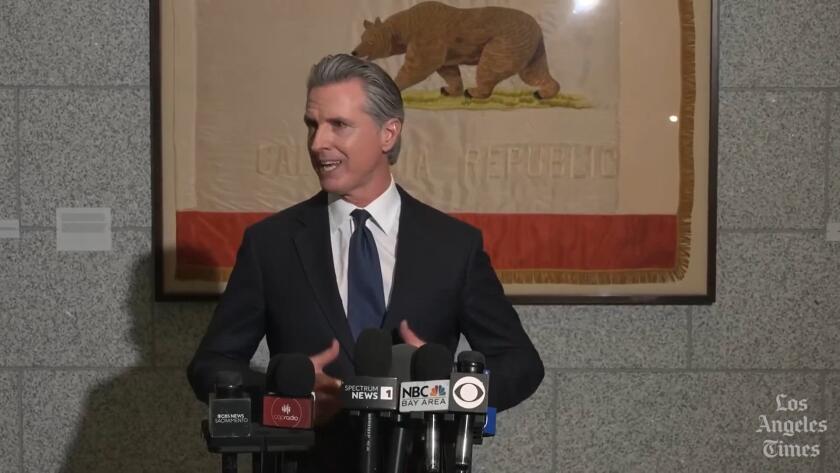President Trump broke the law when he mobilized thousands of members of the California National Guard to the streets of Los Angeles amid protests over immigration raids, and must return control of the troops to Gov. Gavin Newsom, a federal judge ruled Thursday.
U.S. District Judge Charles Breyer of San Francisco granted the state of California’s request for a temporary restraining order Thursday evening, but also delayed enforcement of the order until noon Friday, giving the Trump administration time to file an appeal with the U.S. 9th Circuit.
In a 36-page decision, Breyer wrote that Trump’s actions “were illegal — both exceeding the scope of his statutory authority and violating the 10th Amendment to the United States Constitution.” Breyer added that he was “troubled by the implication” inherent in the Trump administration’s argument that “protest against the federal government, a core civil liberty protected by the First Amendment, can justify a finding of rebellion.”
Newsom, who filed the lawsuit along with the state of California, called the ruling “a win for all Americans.”
“Today was really about the test of democracy, and today we passed the test,” Newsom told reporters in a building that houses the California Supreme Court in San Francisco.
-
Share via
The ruling, California Atty. Gen. Rob Bonta told reporters, is “a critical early indication that upon quick review of the facts of our case, the court sees the merits of our argument.”
“We aren’t in the throes of a rebellion,” Bonta said. “We are not under threat of an invasion. Nothing is preventing the federal government from enforcing federal law. The situation in Los Angeles last weekend didn’t warrant the deployment of military troops, and their arrival only inflamed the situation.”
The Trump administration filed a notice of appeal in the case late Thursday, and is seeking to delay Breyer’s order until the 9th Circuit decides on the case. If the 9th Circuit granted the request for a stay, control of the National Guard would not revert back to Newsom on Friday, Bonta said.
If the 9th Circuit does not grant the stay, Breyer’s order will take effect Friday afternoon, sending the National Guard back to Newsom’s control. Newsom said troops would go back to working on counter drug enforcement, border security and forest management.
During a hearing Thursday, Breyer seemed skeptical of the Justice Department’s argument that courts could not question the president’s judgment on key legal issues, including whether the protests and unrest in Los Angeles constituted either “a rebellion or danger of a rebellion.”
“We’re talking about the president exercising his authority, and of course, the president is limited in his authority,” Breyer said. “That’s the difference between the president and King George.”
Trump and the White House have argued that the military mobilization is legal under Section 12406 of Title 10 of the U.S. Code on Armed Forces, which gives the president the authority to federalize the National Guard if there is “a rebellion or danger of a rebellion against the authority of the government of the United States.”
“The protests in Los Angeles fall far short of ‘rebellion,’” Breyer wrote. There were instances of violence, he said, but the Trump administration did not identify “a violent, armed, organized, open and avowed uprising against the government as a whole.”
“The evidence is overwhelming that protesters gathered to protest a single issue—the immigration raids,” Breyer wrote.
Title 10 of the U.S. Code also requires that orders from the president “be issued through the governors of the States.”
As governor, Newsom is the commander in chief of the California National Guard. Last Saturday, Defense Secretary Pete Hegseth sent a memo to the head of the California Guard to mobilize nearly 2,000 members, who then sent the memo to Newsom’s office, the state’s complaint said. Neither Newsom nor his office consented to the mobilization, the lawsuit said.
Newsom wrote to Hegseth on Sunday, asking him to rescind the troop deployment. The letter said the mobilization was “a serious breach of state sovereignty that seems intentionally designed to inflame the situation, while simultaneously depriving the state from deploying these personnel and resources where they are truly required.”
“I’m trying to figure out how something is ‘through’ somebody, if in fact you didn’t send it to him,” Breyer asked. “As long as he gets a copy of it at some point, it’s going through?”
Breyer was less willing, however, to engage in the legality of Trump’s deployment of U.S. Marines to Los Angeles. Attorneys for California noted that 140 Marines were scheduled to relieve and replace Guardsmen over the next 24 hours.
Protests emerged across Los Angeles on Friday in response to a series of flash raids by Immigration and Customs Enforcement agents across the county. A handful of agitators among the protesters committed violence and vandalism, prompting Trump to quickly deploy the California National Guard to respond. He added active-duty Marines to the operation Monday. Protests, and some sporadic violent rioting, have continued since the deployments.
Trump has said that the mobilization was necessary to “deal with the violent, instigated riots,” and that without the National Guard, “Los Angeles would have been completely obliterated.”
Breyer said that the Trump administration had identified “some stray violent incidents relating to the protests,” and from there, he said, “boldly claim that state and local officials were ‘unable to bring rioters under control.’”
“It is not the federal government’s place in our constitutional system to take over a state’s police power whenever it is dissatisfied with how vigorously or quickly the state is enforcing its own laws,” Breyer wrote.
The attorneys general from 18 other states, as well as Los Angeles City Atty. Hydee Feldstein-Soto, supported California’s position in the case.
Wilner reported from Washington, D.C., Wong from San Francisco and Nelson from Los Angeles.
